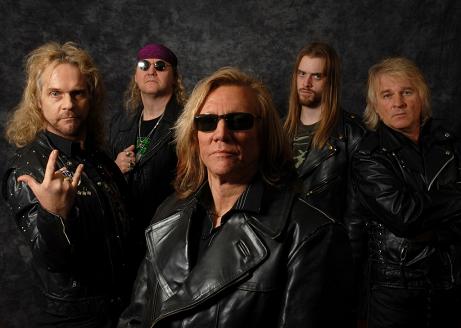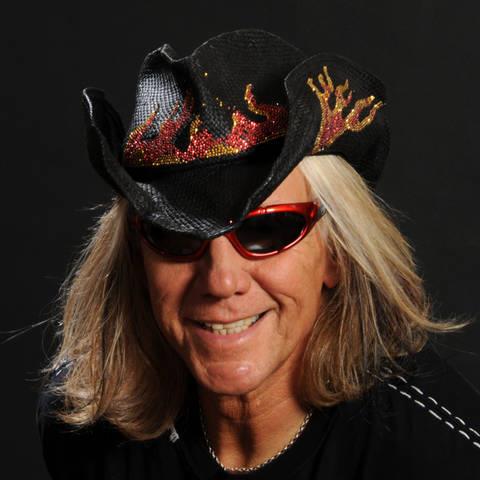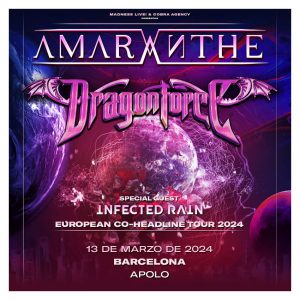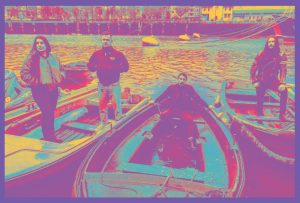HELIX (Eng.)
– First off thanks for answering our interview. How is the band currently doing and what are you up to right now?
Helix is doing what we’ve always done-touring & recording. This year we’re putting the Heavy Mental Christmas show on in Canada. We have a new Christmas single «All I Want for Christmas is the Leafs to Win the Cup», as well as a new CD: Helix: Best of 1983-2012. The CD has two bonus tracks: All I Want & Axe to Grind. The other 19 tracks are previously released. Helix: The Best of 1983-2012 comes out in November on 4 Worlds Media outside North America, on Cleopatra Records in the U.S., and in Canada it’s being distributed by Fontana/Universal.
This weekend (Sept. 28th & 29th) Brent Doerner plays his last two shows with the band: One is at the Rockpile in Toronto and the other at The Masonic Temple in Stratford, Ontario. He is being replaced by veteran guitarist John Claus, who also sings and plays keyboards. In November the band plays The Deerfoot Casino in Calgary, Alberta and the Century Casino in Edmonton, Alberta, followed by the Christmas tour in December which sees Sarah Smith (formally of the Joys, now out with two of her own CDs) replace Kaleb Duck. (Kaleb didn’t want to play Christmas songs but will be back for the regular show in 2013). The band is also working on a Rockumentary with Pat Portelance, who was the lead Canadian photographer on Michael Moore’s movie «Sicko». Expect a new studio CD from the band in 2013. Brian’s writing partner on the past several Helix CDs has been Sean Kelly, who plays guitar for Nelly Furtado, Gilby Clark, and occasionally Carol Pope of Rough Trade.
– If you don’t mind, as I have the pleasure of interviewing one of the bands that I grew up with during the 80’s, I would like to start from the beginning and review the HELIX’s history. How did the band get together and how was it born?
I was in a high school band called «Homegrown». We entered a Battle of the Bands competition at the Central Ontario Exhibition. Through the C.O.E. we met some musicians from Kitchener. Myself and keyboardist Don Simmons teamed up with Bruce Arnold (drums), Ron Watson (guitar), Rick Trembley (guitar), and Keith Zurbrigg (bass) to form the Helix Field Band. The beginning days of the band were rocky. We died in most places we played, and after a while we fired Rick Trembley. Shortly after that Ron Watson left to be replaced by Brent Doerner and shortly after THAT we took on William Seip as our manager. He got us to drop «Field Band» from our name and simply be known as «Helix» and put us out on the Ontario bar circuit. The rest is history.
– Your musical career started back in 1979 with an album entitled «Breaking Loose», followed in 1981 by «White Lace & Black Leather». What are your memories of those first records and what are your thoughts on them decades later?

Those first two albums cost more then I spend on a full length studio CD today. They were recorded with money from my grandmother, Brent’s parents, Bill Seip’s mother, and Bill Seip himself. We sold them offstage between our sets in the bars and eventually sold 15,000 and attracted the attention of the major labels, who ironically all passed on us in the beginning.
– Already in 1983 you unleashed «No Rest for the Wicked», when you started to get recognition and found the HELIX’s sound. How was the step from the first releases to that one? Back then a lot of people we thought that was your debut album.
It was like culture shock big time. We went from playing the Canadian bar circuit to touring the world in some of rock and roll’s most prestigious halls with some of the world’s greatest bands. It was too much for us to absorb at the time.
– I remember that same year you were in Spain supporting KISS. How did the chance of supporting such a big bang as KISS arise? What are your memories of those shows?
Getting on the KISS tour in 1983 was the result of E.M.I. paying $30,000 to KISS for that honor. This tour was a blurr to me. We slept in the van on a sheet of plywood on top of the gear like sardines. It was the most uncomfortable way you could possibly travel and at the time we were really burnt out from touring all across the U.S. the same way. I remember being homesick as hell, the weather was cold and clammy, the rooms (when we did get them) were also cold and clammy. I guess I’m telling you what should have been one of the high points of my career/life was pretty miserable. But it got better…LOL.
– 1984 was another great moment for the band; «Walking the Razor’s Edge» came out and you also played in Spain at the Metal club in Barcelona. What are your memories of that album and year?
I remember travelling across Spain and falling in love with the country. I thought it was very beautiful. I remember doing an interview with «The Pirate», who looked like Ronnie James Dio. The interview started with a big joint of black hash being passed around, followed by a glass of wine. Then the question was asked of me in Spanish, which was translated to English. I’d answer in English and he would translate it into Spanish. More hash…
– You also did one of the most watched and classic videos of the 80’s, «Rock You». How did the idea for that clip born?
It was a play on the words «Rock You». We thought it was a «Flintstone Moment» and that’s what the video was: Helix as the Flintstones.
– The next album, called «Long Way to Heaven», showed a more melodic HELIX. I pesonally think is an album full of good taste. Was that the time for a more melodic album? How did you set out that opus?
Paul Hackman was always a very melodic guy when it came to writing. Long Way to Heaven was just a reflection of where we were at that time in our lives/careers. It was never a concentrated effort to sound one way or the other.
– Then with «Wild in the Streets», in 1987, everythings went again more rockier still without loosing that previous melody. I believe that’s one of your efforts that has gone more unnoticed, but is one of my personal favourites. Do you think that’s true, that it went unnoticed, or is it just a personal appreciation?
That was a good album for us. It was a classic Helix CD but unfortunately music was starting to swing towards grunge, and on top of that, our support at Capitol/E.M.I. U.S. was starting to fall apart.
– Already in the 90’s, you only published two studio albums: «Back for Another Taste» and «It’s a Business doing Pleasure». How did you live the 90’s in terms of shows and tours? As it wasn’t a really good period for the most traditional bands.

Back for Another Taste did very well for us in Canada, where Running Wild in the 21st Century won a Much Music award for best heavy metal Canadian video of the year. Good to the Last Drop, the third release from the album, broke Top 40 in Canada. The band toured Europe with Ian Gillan and across the States through the clubs. In the U.S. the band was on the Grudge label, which did not have the clout of Capitol/E.M.I. As a result, the band received little U.S. airplay on this disc and eventually U.S. live dates dried up. The next CD, It’s a Business Doing Pleasure was initially supposed to be a Brian Vollmer solo CD but when Paul Hackman died in a van accident coming back from British Columbia, the solo project became the next Helix CD. The song «That Day is Gonna Come» (another Top 40 Canadian hit) was a song written about Paul and Brian’s life, metaphorically speaking.
– After this decade, already in 2000 and until now, it seems the band’s activity reemerges. What is the cause behind this impact? Do you think due to new technologies people got to know again about you and also a lot of young people discovered the band?
Yes. Even so, I have to work it everyday-there’s no time to sit back and wait for things to happen on their own. I’ve always taken the initiative in that regard. I always have a project to pull us forward. If I was just doing the «milk run» (playing the same songs over and over) I couldn’t do it. The business is too hard. I’m still in it to perform and write songs. That’s what gives me a high.
– I honestly followed you until the 90’s, now I’m slowly recovering your albums from this last era. How has everything been since 2000 until nowadays, in terms of tours, line-up changes, shows…?
A couple of years ago, quite by accident, the original 80’s lineup of Brent Doerner, Greg «Fritz» Hinz, Daryl Gray, and myself got back together. The new kid on guitar opposite Brent is Kaleb Duck, a protegee of Brent’s. Brent is leaving the band for good after this weekend but will still be involved in filming our videos. We’re also still as close as friends can be.
– And on a view to the future; what are your plans for the upcoming years? Do we have HELIX abck on track for a long time?
Just to keep doing what we’re doing. I see Helix increasing in popularity, not fading away. To ensure that we have to keep putting out quality music and doing all the other things required of successful bands. We’re up for the challenge.







